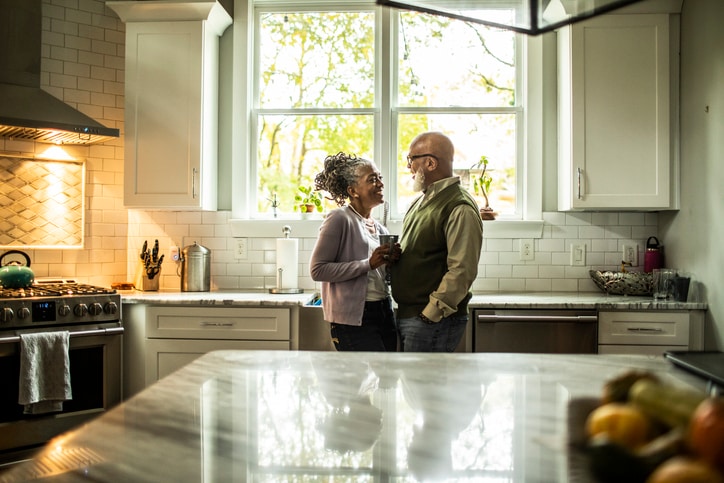When it comes to caring for an older loved one, families must often prepare to make major financial decisions. One of the most significant choices will be whether a senior receives care at home or in a skilled nursing facility when they have higher needs, such as Alzheimer’s care. Both choices have profound ramifications when it comes to financial planning, budgeting and uncovering available benefits.
Whichever you choose, experts strongly recommend researching options in advance of a medical emergency.
“Often, families react to a severe medical crisis,” says Spencer Brown, South Central Chapter President of the Aging Life Care Association. “It becomes a wake up call. They’ll say, ‘$25 an hour for a caregiver to just do bathing and dressing? $6,210 at a nursing home per month?’ If there is a financial cost that’s not supported by insurance or government, and it comes out of their pockets, it can be a rude awakening.”
Wondering about the price tag that comes along with each? Here’s a breakdown of the cost of home care vs nursing homes.
Home care costs
Basic costs
The cost of at-home care depends greatly on need. The median annual cost of a 24/7 home health aide is $235,872 according to the most recent Genworth Cost of Care Survey.
“Twenty-four hour care at home is universally going to be at least twice, if not three times as expensive as a nursing home facility,” says Brown.
“Twenty-four hour care at home is universally going to be at least twice, if not three times as expensive as a nursing home facility.”
Spencer Brown, South Central Chapter President of the Aging Life Care Association
However, if the senior needs fewer hours or if a family member can step in, the cost lowers considerably. If the health aide works 40 hours per week, for example, families will spend a median of $56,160. The cost is similar — $54,080 — for strictly homemaker services such as cleaning and cooking. This is considerably less expensive than round-the-clock nursing home care, which could include dispensing medicine and night supervision.
Costs also vary widely depending on your state. A home health aide in Louisiana costs a median of $122 a day, while they cost $201 in California, according to Genworth.
Costs you may not have considered
Aides often charge higher rates during overnight, weekend and holiday hours, according to Rita Choula, Director of Caregiving with the AARP Public Policy Institute. They may also increase their rates if you hire them for one hour as opposed to, say, a three-hour block due to potential wage losses on other jobs.
“You’ll typically see two to four hour time slots,” says Choula. “If it’s a matter of respite and you just need an hour to go to the grocery store, it may still work out better financially for you to pay for three hours.”
In addition to an aide’s salary, families who are caregiving at home will have to pay for standard living costs such as:
- Groceries.
- Electric bills .
- Medical supplies not covered by insurance.
- Homes may also need pricey modifications in order to accommodate the senior, such as trip hazard removal or bathtub accessibility.
Family caregivers must also consider personal costs, such as transportation or time off from work in order to perform these duties.
“We all know that hiring aides for 40 hours a week isn’t going to cover it for a person who needs constant care,” says financial planner Darin Shebesta, noting that families will have to make arrangements tailored to their individual schedules.
Ways to pay for home care
Older adults may be eligible for federal benefits. Or, if they are able to plan ahead, they may be able to secure insurance benefits.
Medicaid/Medicare
Medicaid coverage of home care varies depending on state. Medicare pays for 21 days of at-home health aide and skilled nursing care, though the workers must operate for less than eight hours a day and less than seven days a week during that period. This does not include homemaking services.
Private health care insurance
Most private health care insurance policies don’t cover at-home care, though policyholders might be able to secure special coverage through an Employee Assistance Program, or through special programs designed for federal employees, veterans, teachers or healthcare workers.
Long-term care insurance
For those who plan in advance, seniors and caregiving proxies can purchase long-term care insurance or a combination permanent life/long-term care insurance policy in order to cover at-home care. However, these policies should be purchased well before a crisis. The costs get higher as the senior ages.
Federal programs
Federal programs, such as SNAP, exist to help low-income individuals with food costs, phone bills, home energy bills and more.
Nursing home costs
To avoid common and devastating financial surprises, it’s important to understand nursing home costs in advance.
“What usually happens is, it’s a crisis situation where someone is very sick and hospitalized, and the family realizes that they’re not able to provide the level of care their loved one requires at home,” says Choula.
“What usually happens is, it’s a crisis situation where someone is very sick and hospitalized, and the family realizes that they’re not able to provide the level of care their loved one requires at home.”
RITA CHOULA, DIRECTOR OF CAREGIVING, AARP PUBLIC POLICY INSTITUTE
Basic costs
The national annual median cost of 24/7 nursing home care is $94,900 a year for a semi-private room and $108,405 for a private one, says Genworth. This price tag includes basic daily living costs including food, housing and medical supplies in addition to round-the-clock access to skilled nurses and aides.
Like home care, costs vary widely depending on your state. A private room costs $6,060 monthly in Louisiana and $12,167 in California.
Costs you may not have considered
The cost of nursing home care can be steep for other reasons.
Residents may be charged a one-time fee for their intake health assessment. They will also pay a bed fee if they leave the nursing home but want to hold their spot, which has been a common practice during COVID-19, says Choula.
Some nursing homes may charge extra for particular services, such as physical therapy, memory care or grooming beyond the standard measures. Choula says it’s critical to read the nursing home contract thoroughly to weed out extra costs.
Families will have to factor in transportation costs, particularly if the family lives far away from the nursing home, says Brown.
Ways to pay for nursing home care
A senior may be able to use their existing federal and private benefits to pay for nursing home care.
Medicaid/Medicare
Medicaid covers 100% of basic nursing home stay costs. The senior must be eligible for Medicaid, however, and eligibility varies by state. Medicare pays for 20 days of a nursing home stay, then 80% of costs for the next 80 days of a stay. Medicare coverage phases out completely after 100 days.
Private health care insurance
Most private health care insurance policies don’t cover nursing home care. However, like at-home care, policyholders might be able to secure special coverage through an Employee Assistance Program, or through special programs designed for federal employees, veterans, teachers or healthcare workers.
Long-term care insurance
Seniors, or representatives with power of attorney, can purchase long-term care insurance or a combination permanent life/long-term care insurance policy. These policies should be purchased in advance of a medical emergency.
Assigning benefits rights
CFB Board Ambassador Marguerita Cheng also pointed to a little-known benefit to using a nursing home: A facility can work directly with the insurance providers if an older adult assigns the facility benefits rights. This will relieve the senior and caregivers of dealing with insurance companies or government benefits programs.
How to decide which is best for your pocketbook
Making the choice between home care and a nursing home can be difficult to do on your own. Without consulting professionals and performing research in advance, many caregivers are inclined to make a knee jerk decision in the heat of a crisis without consulting the older adult or considering what’s best for everyone, says Brown.
“Families get overwhelmed. They see some changes in their parents and they’re not used to being in the caregiver role, and so they take an immediate action that could steamroll a person’s autonomy,” says Brown. “I advise people to take a step back and exercise extreme caution.”
Families may turn to geriatric care specialists to formulate a comprehensive aging plan that’s right for them. These experts are generally social workers or licensed nurses and can be found at agencies like
- Accountable Aging Care Management, a private aging planning company.
- Family Tree In-Home Care, a private caregiver provider.
- U.S. Administration on Aging, a government agency that helps families plan senior care.
Shebesta also suggests searching for an insurance broker or financial advisor with a Certification for Long-Term Care (CLTC), which means they have undergone specific long-term care training. Estate planning expertise may also come in handy when it comes to finances around aging, especially when it comes to legal matters such as granting power of attorney to a trusted person.
By weighing the costs associated with nursing home and home care — and after consulting with experts — you will choose an option that best suits your aging loved one.



